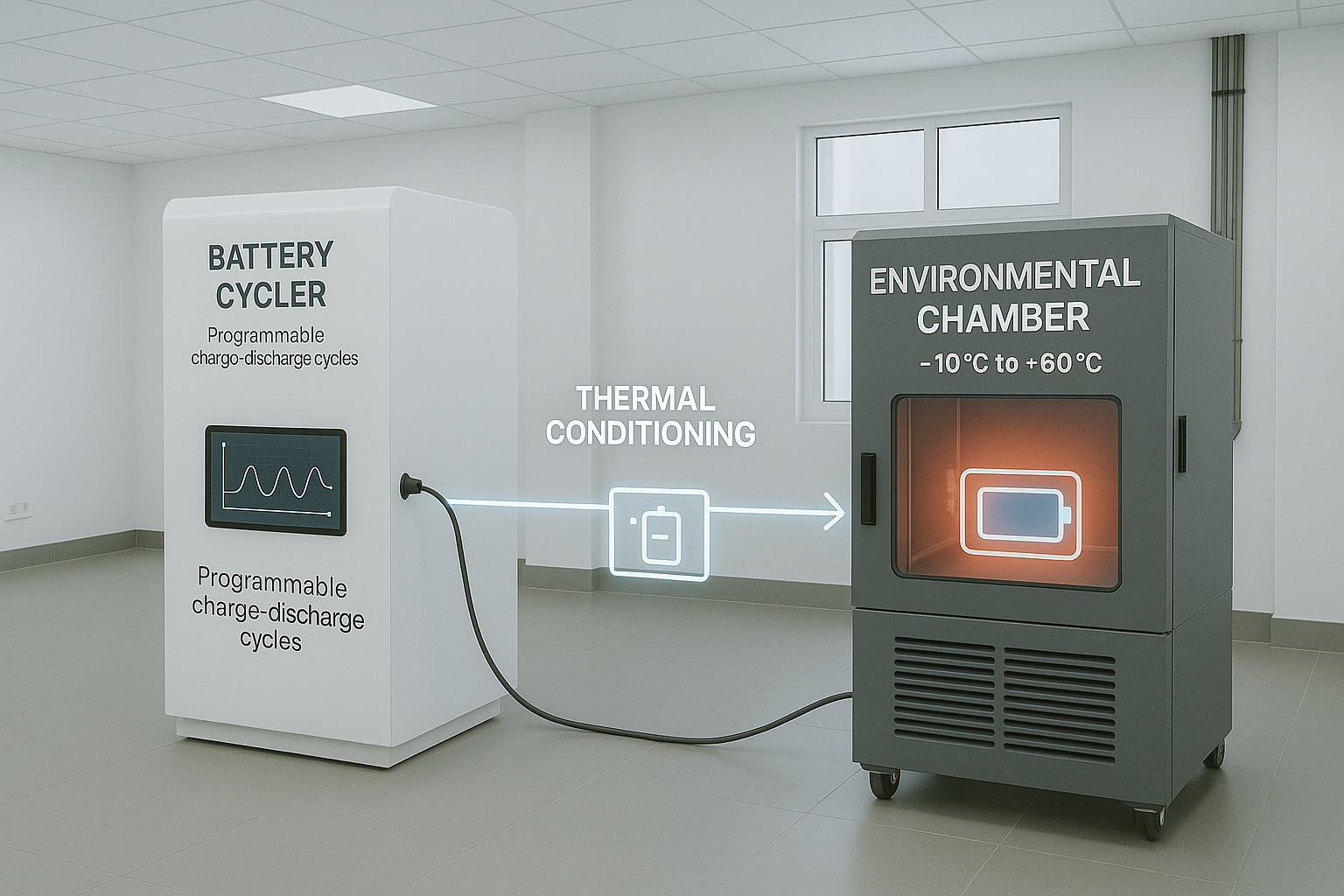Why Every EV Lab Needs a Battery Cycler with Data Analytics
As the electric vehicle (EV) revolution gains traction
across the globe, educational institutions and research centers are racing to
equip themselves with the tools and technologies needed to prepare the next
generation of engineers. At the heart of any meaningful EV research and
training lab lies a critical component that often gets overlooked—the Battery
Cycler with Data Analytics (BCDA).
Batteries account for nearly 50% of the total cost of an EV.
Understanding how they behave under real-world conditions is crucial not just
for efficiency and safety, but also for longevity and cost optimization. That
is why every EV lab—whether focused on skill development or advanced
R&D—must have a Battery Cycler integrated with powerful analytics
capabilities.
What Is a Battery Cycler with Data Analytics?
A Battery Cycler with Data Analytics is a system that
performs continuous charging and discharging of batteries under
controlled conditions, while also collecting and analyzing performance data.
Ecosense’s BCDA goes a step further by integrating an environmental chamber,
smart sensors, and a software-controlled platform that allows
students and researchers to:
- Run
customized test cases (CC, CV, CP charging)
- Monitor
voltage, current, and temperature in real-time
- Analyze
battery behavior at different C-rate
- Study
performance in extreme temperature and humidity conditions
- Evaluate
state of health (SoH) over charge-discharge cycles
- Modify
and test their own control algorithms
This transforms the EV lab from a static learning space into
a dynamic battery research environment.
Why Is It Essential in Modern EV Labs?
EVs rely heavily on battery performance, and poor battery
selection or mismanagement can lead to range anxiety, premature failure,
or inefficient energy usage. BCDA fills this educational gap by
offering:
1. Wholesome Learning and Research Opportunity
Ecosense’s BCDA is not just a tool—it’s a platform for
foundational understanding and advanced experimentation. It enables
students to not only test batteries, but to design and validate algorithms
for battery control, safety cut-offs, and efficiency optimization.
2. Integrated Learning Ecosystem
The BCDA includes a battery pack, cycler system,
and environmental chamber, all controlled via FPGA and software. This
plug-and-play model is self-contained, meaning institutions don’t need to
invest in multiple disjointed setups to run battery experiments.
3. Real EV Components for Real Results
Unlike training kits that rely on scaled-down or dummy
components, the BCDA uses actual EV-grade hardware—including a 48V, 24Ah
LiFePO₄ battery, BMS, and industrial-grade chamber—ensuring realistic outcomes
and industrial relevance.
4. Customizable and Open-Source Software
The system is built on an open software framework,
allowing faculty and students to modify control algorithms, create new
test cases, and tailor experiments to their academic or research goals.
Key Experiments You Can Run with BCDA
Here is a snapshot of the kinds of practical and
research-grade tests enabled by the Ecosense BCDA platform:
- Charging
and discharging analysis under CC, CV, and CP modes
- C-rate
testing to understand stress behaviors
- Battery
aging studies through hundreds of controlled cycles
- Fuel
economy comparisons between new and aged batteries
- Thermal
stress testing in environments ranging from -10°C to +60°C
- State
of Health (SoH) evaluation to track degradation
- Temperature
cut-off detection for BMS optimization
- Charge
profile comparisons (e.g., 0–100%, 30–100%, 50–100%)
- Calculation
of specific energy, power, life span, and cost-efficiency
These experiments are invaluable for both undergraduate labs
and PhD-level research.
The Role of Analytics in Battery Testing
What sets BCDA apart is its powerful data visualization
and control platform. The system does not just record numbers—it provides
insights. Data captured during tests is displayed as:
- Voltage-current-temperature
curves
- Charge/discharge
efficiency graphs
- Real-time
alerts for safety thresholds
- State-of-health
tracking over time
- Exportable
datasets for academic reports or publications
All this is made possible through a dedicated application
software and FPGA-based controller, giving users a clean, intuitive
interface to run tests and analyze results.
Designed for Classroom and Research Environments
Ecosense’s BCDA system is modular and scalable,
making it equally suitable for:
- Engineering
colleges and polytechnics teaching EV fundamentals
- Universities
and IITs conducting advanced battery research
- Skill
development centers offering technician training
- Incubation
hubs and startups needing rapid battery testing
With compact design, full software control, and integrated
safety features, the BCDA can be installed in regular classroom settings—no
specialized infrastructure required.
What Students and Researchers Gain
With access to a battery cycler like BCDA, learners gain:
- Hands-on
skills in battery testing, BMS design, and diagnostics
- Real-world
data analysis experience applicable to industry roles
- A
platform for innovative research, capstone projects, and
publications
- Confidence
to work with high-voltage systems and embedded controls
- Exposure
to cutting-edge tools used by leading EV OEMs
In short, BCDA does not just prepare students for jobs—it
prepares them for the next wave of EV innovation.
A Smart Investment in Battery Intelligence
In today’s EV labs, having motors, controllers, and drive
cycle simulators is important—but having a Battery Cycler with Data
Analytics is essential. It unlocks deep learning, sharpens critical
thinking, and empowers the kind of experimentation that leads to breakthroughs
in battery technology.
At Ecosense, we design BCDA not just as a piece of
lab equipment, but as an educational platform—one that evolves with your
curriculum, research needs, and technological ambitions. If your institution is
building or upgrading its EV Lab, start with the battery, and test it with
intelligence.
Ready to bring advanced battery testing to your EV Lab?
Let us power the future together.

